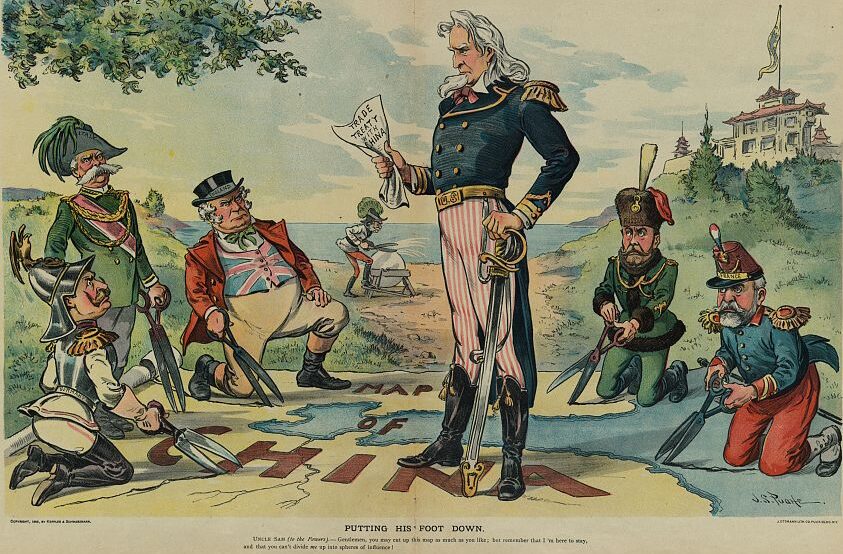The AP® US History exam covers centuries of topics, policies, trends, and events, and you need to have a solid working knowledge all of them in order to score well. However, you don’t need to be an expert on every battle, law, and political debate. The most important things to know on each topic for the APUSH test are what it is, its historical context or setting, and why it is important in the scope of US History. In this AP® US History crash course, we will review those aspects of Open Door Policy.
Definition
The term “open door policy” refers to the proposition to keep trade in China open equally to trade with all countries, preventing any one nation from controlling trade in the region. The policy also called for powers to respect Chinese territorial integrity. In other words, the countries with “spheres of influence” – areas of political and economic control – in China must allow Chinese officials to regulate trade and impose tariffs. This measure was intended to appease opponents of total imperialism by maintaining Chinese sovereignty.
Historical Context
During the late 19th and early 20th centuries, countries scrambled to extend their political and economic power worldwide. This period is referred to as the Age of Imperialism, because the European powers and nations like the US and Japan focused heavily on the expansion of colonial territory and the growth of global empires.
In China, the competition between Europeans, Americans, and Japanese was so intense that the imperial powers began literally carving up the territory into pieces. Each of the expanding colonial nations would have a sphere of influence within which it could carry out free trade in China’s rich markets.
The United States held a particular interest in open door policy and in China itself. After the Spanish-American War ended in 1898, the US found itself with a large amount of newly won territory, including the Philippine Islands. With this new area of influence, the US had a foot in the door to economic advantages in Asia. China became the next step in the imperial expansion process.Thus, Secretary of State John Hay wrote the Open Door Note in 1899, proposing the equal division of Chinese territory. Opening the door to China would allow the United States to gain economic influence in the region without having to carve out its own piece.

Why is Open Door Policy Important?
Open door policy reflected the intense spirit of competition among global powers during the Age of Imperialism. All imperial countries accepted the United States’ proposal except Russia, with the goal of creating relatively equal spheres of influence. Ultimately, however, imperial powers continued to exploit the resources and labor in China, and the open door experiment led to threatening resistance by workers within China.
In 1900, an anti-foreign movement known as the Boxer Rebellion arose. A secret Chinese organization called the Society of Righteous and Harmonious Fists gathered strength and attacked foreign missionaries in China. As the conflict grew, it became a violent rebellion that led to the deaths of thousands of Chinese nationals and hundreds of foreigners. This rebellion illustrated the flaws in open door policy as promises of Chinese sovereignty were exposed as empty.
Open door policy embodied the attitude of global powers during the Age of Imperialism as the economic markets continued to expand worldwide. Imperial nations sought as much economic control as possible, expanding into any un-colonized territory they could find and claiming it as their own. In addition, the policy created some goodwill between the Chinese and Americans, which would later lead to American conflict with Japan over China.
What You Need to Know for the APUSH Exam – Multiple Choice
The multiple choice section of the AP® US History exam will contain more specific and fact-based questions. You should know about Secretary of State John Hay’s role in the creation of open door policy via the Open Door Note. You should also know the key players in the division of Chinese territory, especially the United States, Japan, and Great Britain. Keep in mind that Russia was the only imperial nation to reject participation in open door policy.
You should also know about the significance of the Boxer Rebellion in terms of its display of the weaknesses of open door policy. The AP® US History exam has a tendency to ask about the significance of rebellions and revolts, so an understanding of the broader connections between the Boxer Rebellion and open door policy itself will be useful, even in the multiple choice section.
What You Need to Know for the APUSH Exam – Essays and Document-Based Questions

The written portion of the AP® US History exam will call for more conceptual discussion of events, and patterns. You should be able to connect open door policy with the broader Age of Imperialism, as well as the Boxer Rebellion. You should also be able to discuss the United States’ own interests in China, and why they were so insistent on gaining financial advantages in the region.
Here is an example of a past APUSH Free Response Question dealing with open door policy:
“United States foreign policy between 1815 and 1910 was determined less by economic than strategic, moral, or political interests. Assess the validity of this generalization with reference to at least TWO major episodes (for example: treaties, war, proclamations, annexations, etc.) in the foreign policy of the United States between 1815 and 1910.”
This FRQ calls for a discussion of the strategies embedded within American foreign policy in a time period that includes the Age of Imperialism. 1815 to 1910 is a broad timespan, but you do not need to encompass the entire era of foreign policy in your answer. If you feel confident in your knowledge of the Age of Imperialism, you can choose your two major episodes from this period. For example, you could first discuss the political reasoning behind the Spanish-American War, and then the political motives of open door policy.
Remember: this question asks you to assess the validity of a certain statement, so you must do so in your thesis. APUSH graders are not only looking for historical knowledge, but also that you are answering the correct question. You could go in either of two directions, depending on which episodes you choose and the way you analyze them. If you would like to say the statement is valid, you should focus more on the political strategy of open door policy. Although open door policy was an economic system, you could argue that the motives were fundamentally strategic and political because of the desire for territorial expansion of influence.
Conversely, you could argue that the statement is not completely valid. If this is the path you choose to take, make sure to mention that while open door policy had political and strategic implications, it primarily was an economic proposal. You would need to argue that the main focus of US foreign policy, through actions such as this one, was financial and geared toward revenue more than anything else at this time.
With this crash course as your guide, you’re in a good position to talk about various aspects of open door policy on the AP® US History exam. Remember the connections and the key motives, and you’ll be well on your way to scoring a 5 on APUSH exam day.
By the way, you should check out Albert.io for your AP® US History review. We have hundreds of APUSH practice questions written just for you!








